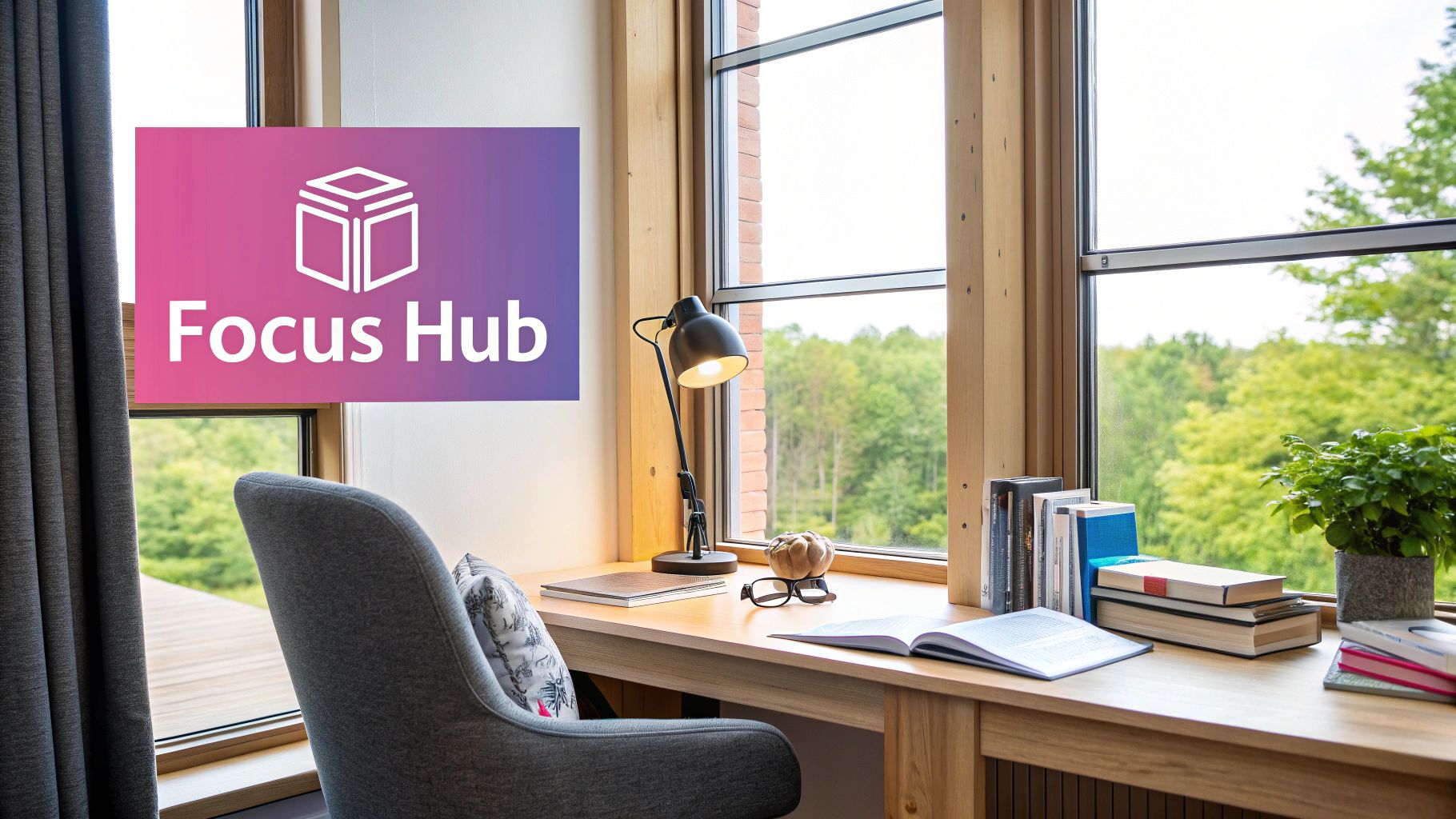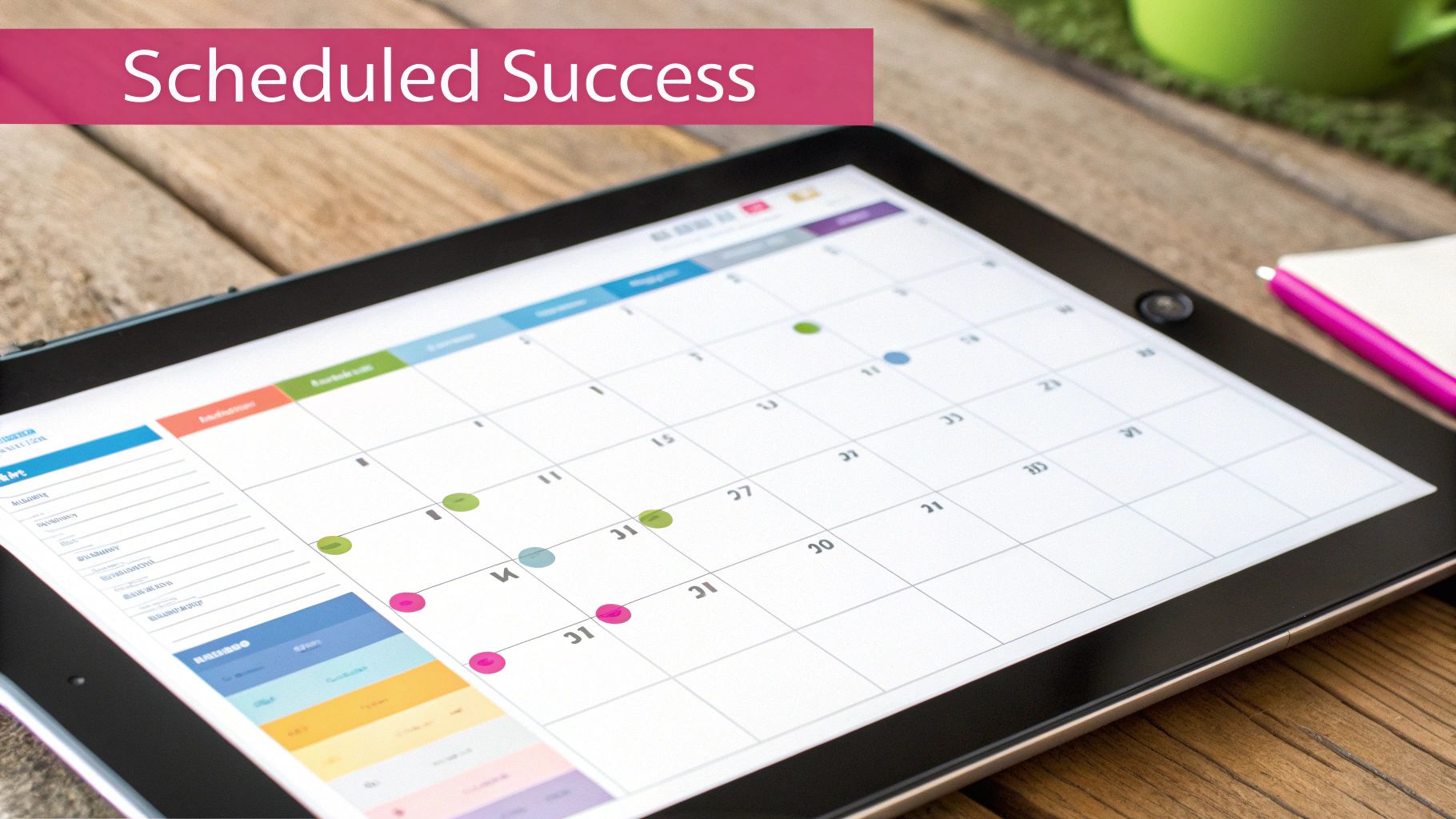
Proven Study Tips for ADHD: A Complete Guide to Better Learning
Understanding Your ADHD Learning Style

Everyone with ADHD has their own unique way of learning and processing information. Rather than seeing ADHD as a limitation, it's important to recognize your personal cognitive strengths and find study approaches that match how your brain naturally works best. The key is shifting from thinking "I can't learn" to understanding that you simply learn differently.
Identifying Your Learning Preferences
The foundation of effective studying with ADHD starts with recognizing your individual learning style. Many people with ADHD excel when using active, multi-sensory learning methods rather than passive approaches like just reading or listening. Engaging multiple senses at once often leads to better understanding and retention of information. Here's how different learning preferences typically break down:
- Visual Learners: Do well with diagrams, mind maps, color-coding, and videos. For example, you might draw historical timelines or create flowcharts to understand scientific concepts.
- Auditory Learners: Benefit from recorded lectures, group discussions, and reading material out loud. Try recording yourself explaining key ideas and listening back later.
- Kinesthetic Learners: Learn through physical activities, hands-on practice, and real applications. This could mean building models, role-playing historical events, or conducting simple experiments.
Once you identify your preferred learning style, you can adapt your study methods to work with your natural strengths.
Working With Your ADHD, Not Against It
Standard study approaches often don't align well with how the ADHD brain functions. For instance, trying to maintain focus during long study sessions usually leads to frustration and poor results. Research shows that shorter study periods with regular breaks work much better, allowing you to take advantage of your natural focus cycles and prevent mental fatigue. Paying attention to when you're most alert and productive helps you schedule effective study times.
People with ADHD sometimes fall into the trap of surface-level learning, focusing on memorization instead of deep understanding. While this might work for basic facts, it makes it harder to grasp complex topics that need critical thinking. The solution is to use active learning techniques – like explaining concepts to others or creating practical examples – which help you truly process and retain information. When you teach something to someone else, you quickly discover any gaps in your understanding.
Being aware of your typical patterns and challenges lets you develop study strategies that actually work for you. The most effective approach is to try different techniques and stick with what gives you the best results. Remember that what works for others may not work for you – and that's perfectly fine.
Creating Your Perfect Study Sanctuary

Everyone learns differently, especially students with ADHD. Having the right study environment can make all the difference between scattered thoughts and laser focus. While there's no universal perfect setup, you can create a personalized study space that works for your unique needs. Let's explore how to set up your ideal study environment to help you succeed.
Taming Sensory Overload: Sight, Sound, and Touch
Students with ADHD often experience heightened sensitivity to their surroundings. A ticking clock or buzzing light that others might tune out can become a major distraction. To create an environment that supports focus, consider these key elements:
- Lighting: Natural light works best for many students. If that's not available, use warm-toned desk lamps instead of harsh overhead lighting that can cause eye strain and restlessness.
- Sound: Test different sound environments to find what helps you concentrate. Some students need complete quiet, while others focus better with background music or white noise. Keep noise-canceling headphones handy when studying in busy places.
- Touch: Physical comfort matters more than you might think. Choose a supportive chair, clear your desk of irritating textures, and keep your favorite pens and supplies within easy reach.
Designing Your Dedicated Study Zones: Home and Public
Having consistent places to study helps train your brain to focus when you're there. At home, pick a specific spot that's only for studying – maybe a corner desk or a particular seat at the kitchen table. Keep this area clean and organized, with all your supplies ready to go.
Sometimes studying at home isn't practical though. Scout out some reliable backup locations like a quiet library corner or less-crowded café. Pack a "study kit" with everything you need – headphones, supplies, and fidget tools – so you can recreate your ideal study setup anywhere.
Tackling Tricky Environments and Minimizing Distractions
Even in the best study space, distractions can creep in. The key is knowing your personal trouble spots. If social media keeps pulling your attention, use website blockers during study time. When clutter builds up and scatters your focus, take 5 minutes to tidy up before starting work. Visual timers can help you stay on track, while breaking study sessions into shorter chunks prevents mental fatigue. Remember, effective studying isn't about forcing yourself to focus – it's about creating conditions where focus comes naturally. When you understand what helps you concentrate and set up your environment to support those needs, productive study sessions become much more achievable.
Mastering Time Without Fighting Your Brain

Standard time management advice often misses the mark for students with ADHD. Common techniques like detailed planners and strict schedules can lead to discouragement since they don't account for how the ADHD brain naturally works. The good news is that you can effectively manage your time by understanding and working with your unique cognitive patterns. Let's explore practical ways to align your study habits with how your brain actually functions best.
Identifying and Leveraging Peak Focus Periods
Just like everyone has optimal times for sleep, we each have natural periods when our focus is strongest. For students with ADHD, these peak focus windows are especially valuable. Pay attention to when you feel most alert and productive during your day. Are you sharpest early in the morning, or do you hit your stride in the afternoon or evening? Once you spot these patterns, plan your most challenging work for these times.
For instance, if you notice you're most focused between 10 AM and noon, use that time for complex assignments or difficult subjects. Save simpler tasks like reviewing flashcards or organizing notes for times when your concentration naturally dips. This approach makes studying feel more natural and less like an uphill battle.
The Power of Short Bursts and Strategic Breaks
Trying to study for hours without breaks often backfires for students with ADHD. Instead of forcing extended focus, break your work into shorter segments using methods like the Pomodoro Technique. This approach involves 25 minutes of focused work followed by a 5-minute break. By matching your natural attention span, you'll find it easier to stay engaged and remember what you're learning.
Your breaks matter just as much as your study time. Rather than scrolling social media, choose activities that truly refresh your mind. A quick walk around the block, some favorite music, or five minutes of deep breathing can help reset your focus. These purposeful breaks help you return to studying with renewed energy and clearer thinking.
Tools and Apps Designed for ADHD Minds
The right digital tools can help students with ADHD stay on track and boost their learning. Many apps offer features specifically designed for ADHD challenges, like breaking down big tasks and providing visual reminders. For example, Notescast turns written notes into engaging video content, making it easier for visual learners to process information. Other helpful tools include website blockers that limit distractions during study time, allowing for better focus.
Finding the right combination of tools takes some trial and error. Experiment with different apps and features to discover what helps you study most effectively. The goal is to create a personal system that supports your learning style while managing time in a way that feels natural to you.
Transforming Information Into Knowledge

A productive study space and good time management create the foundation for academic achievement. But for students with ADHD, the key is converting information into knowledge that lasts. This means going beyond basic memorization to engage with material in ways that match your individual learning style. Let's explore study techniques that help develop this deeper understanding.
Multi-Sensory Engagement: Bringing Your Studies to Life
Silent reading from textbooks often feels ineffective for students with ADHD – the mind wanders and information doesn't stick. Multi-sensory learning offers a better way by involving multiple senses at once to create richer, more memorable experiences. For example, if you learn best visually, try sketching colorful diagrams while listening to related audio content. The combination of seeing and hearing helps cement concepts in memory. For hands-on learners, building physical models or acting out processes creates strong connections to the material. Getting your whole body involved in learning makes abstract ideas concrete and easier to grasp.
Creative Study Methods: Making Learning an Adventure
Standard study approaches can feel dull and limiting, especially with ADHD. Adding creative elements turns study sessions into engaging explorations. Mind maps let you organize information visually, like a tree with the main topic as the trunk and related ideas branching outward. This format makes complex subjects more approachable and memorable. Storytelling is another powerful tool – weave historical facts into narratives or turn scientific concepts into short plays. When dry facts become compelling stories, you both enjoy learning more and remember material better.
Active Recall: Testing Your Knowledge, Strengthening Your Memory
Active recall focuses on retrieving information from memory rather than just reviewing it repeatedly. This process strengthens neural pathways and improves long-term retention. The Feynman Technique, named after physicist Richard Feynman, involves explaining concepts as if teaching them to someone else. This reveals gaps in understanding and reinforces what you know well. Flashcards are another effective tool – instead of passively reading definitions, quiz yourself on key terms and ideas. The effort of actively recalling information makes learning stick better than passive review. This approach helps identify areas needing more work while building strong knowledge foundations. When tailored to ADHD learners, these methods boost understanding, retention and academic results by making studying an active, engaging process that leads to deeper learning.
Make sure to preserve the video iframe exactly as is!
Integrating Treatment With Academic Success
Creating good study habits is essential for academic achievement, especially for students with ADHD. When you combine effective study methods with proper medical treatment, you set yourself up for even greater success. This section explores practical ways to blend study strategies with various treatment approaches like medication, therapy, and academic coaching.
Synchronizing Medication and Study Sessions
Taking ADHD medication can make a big difference in academic performance, but timing is everything. Each person responds differently to medication, so it's important to track when you feel most focused and alert. Work closely with your doctor to adjust your medication schedule around your key study periods. Be open with your healthcare team about any academic challenges you face – this helps them fine-tune your treatment plan to support your learning goals.
Adapting to Changes in Treatment Plans
Your ADHD treatment will likely need adjustments over time as your needs change. During these transitions, having reliable study routines becomes even more important. Stay organized by keeping detailed notes about what works best for you. Talk regularly with your doctors and teachers about how treatment changes affect your studying. Think of your study system as something that can flex and adapt alongside your treatment – this mindset helps you stay on track even when other things shift.
Exploring Different Management Approaches
Managing ADHD effectively often requires multiple strategies working together. Beyond medication, tools like therapy, regular exercise, and mindfulness practices can all support academic success. Talk with your healthcare providers about which combination might work best for you. For example, behavioral therapy teaches valuable skills for staying organized and controlling impulsivity – abilities that directly improve study effectiveness. When you integrate these various approaches thoughtfully, you'll likely see better results than using any single method alone.
Real-World Examples and Backup Strategies
Many students find success by carefully matching their treatment and study schedules. Some schedule challenging coursework when their medication is most effective. Others use therapy techniques like breaking work into smaller chunks when focus wanes. Having backup plans is also crucial – like finding a quiet study space or taking short breaks when needed. Think of it like having both a main route and alternate paths to your destination. This preparation helps you handle unexpected challenges while staying focused on your academic goals.
Building Study Habits That Actually Stick
Having a study space and planner are great starting points, but lasting academic success requires turning good intentions into consistent actions. Just like building physical strength, developing reliable study habits takes dedicated practice and the right approach. Here's how students with ADHD can create study routines that stick.
Laying the Foundation: Consistent Routines and ADHD
For students with ADHD, establishing reliable study habits provides essential structure and stability. Rather than following an inflexible schedule, the key is creating regular patterns around when and where you study. Having set study times and spaces helps train your brain to focus when needed, similar to how a dedicated workspace puts you in "study mode." This predictability makes it easier to stay on track with academic goals despite the challenges of ADHD.
Tracking Progress Without Overwhelm: Small Wins, Big Impact
Progress tracking doesn't need complex systems – simple methods often work best, especially with ADHD. Basic checklists, timers, or quick notes can effectively monitor your study routine. Focus on celebrating small achievements rather than getting overwhelmed by big tasks. For example, check off individual sections as you work through a chapter instead of fixating on finishing it all at once. These small victories build confidence and reinforce positive study habits.
Adaptability is Key: When Study Tips for ADHD Need Tweaking
Being flexible with study strategies is essential, particularly for students with ADHD. What works one day may need adjustment the next. If your usual study spot becomes too distracting, try a new location. When time management techniques stop working, explore different approaches. This willingness to adapt ensures your study habits support rather than frustrate your learning process.
Celebrating Successes: Reinforcing Positive Study Habits
Taking time to acknowledge your study achievements helps cement good habits. This doesn't mean throwing celebrations for every assignment, but finding meaningful ways to reward your efforts. After focused study sessions, allow yourself guilt-free breaks doing activities you enjoy – whether that's music, hobbies, or time with friends. Creating positive associations with studying makes it something to anticipate rather than avoid.
Many students struggle with traditional study methods, especially those with ADHD. Notescast can be an invaluable tool in your toolkit of study tips for ADHD. Transform your notes and study materials into engaging videos, making learning more interactive and easier to retain. Try Notescast today and experience a new way to learn! Get started with Notescast now!
